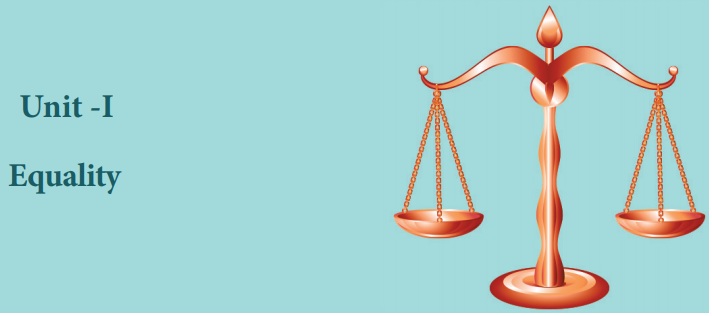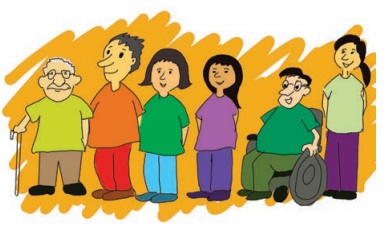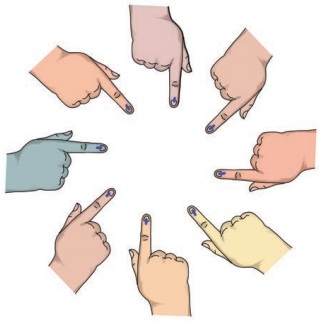Term 1 Unit 1 | Civics | 7th Social Science - Equality | 7th Social Science : Civics : Term 1 Unit 1 : Equality
Chapter: 7th Social Science : Civics : Term 1 Unit 1 : Equality
Equality
CIVICS
Unit –I
Equality

Learning Objectives
•
To understand the meaning of Equality
•
To know the importance of Equality
•
To learn the different types of Equality
•
To know the various Articles of our constitution that have guranteed Equality


Introduction:
Nature
has made man inequal in colour, height, talent, physical strength etc., and the
natural inequalities can never be rectified. Even the twins looking like the
similar are not equal in their abilities. Man made inequalities on the basis of
caste, money religion etc can be rectified. It is universally accepted that
people are differed in their capacity, ability, attitude etc but at the same
time, it is also accepted that they should be given equal opportunities for the
development of their skills and talents.
What is Equality?
Equality
is ensuring individuals or groups that are not treated differently or less
favourably on the basic of specific protected characteristic, including areas
of race, gender, disability, religion or belief, sexual orientation and age.
According
to Prof Laski “Equality does not mean identity of treatment, the sameness of
reward. It means first of all absence of social privilege, on the second it
means that adequate opportunities are laid upon to all”.
Importance of Equality
Equality is a powerful moral and
political ideal that has inspired and guided human society for many centuries.
The concept of equality invokes the idea that all human beings have equal worth
regardless of their caste, colour, gender, race or nationality. The democratic
ideals such as liberty, equality etc are meaningful and effective only when
they are implemented with justice.
Kinds
of Equality
Social
equality

Social
equality means that all citizen are entitled to enjoy equal status in society.
There should not be any discrimination of caste, creed, colour and race. All
should have equal opportunity to develop their personality and to complete
goals.
Civil
Equality
Civil
equality is enjoyment of civil rights by all citizen. There should not be any
discrimination of superior or inferior, the rich or the poor, caste or creed.
Equal rights should be available to all the persons and nobody should be denied
enjoyment of any rights. Rule of law is in force in England and in the eyes of
law all are equal and equal treatment is given to all by the rule of law. In
India the same rule of law is followed.
Rule of law was advocated
by A.V.Dicey, the British legal luminary.
Political Equality
All the
democratic countries including India have guaranteed the political rights to
all citizens. It includes
• Right to vote
• Right to hold public Office
• Right to
criticise the government

Citizens
should have equal opportunity to actively participate in the political life.
These rights can be enjoyed through the Universal Adult Franchise. In India the
voting right is given to all the citizens who has attained 18years of age
without any discriminations. India is the first country to give right to vote
to women from the very first general election held in the year 1952. In
Switzerland the right to vote is given to women in 1971. Any person who has
completed the age of 25 years can contest in the election. Right to criticise
the government is also very important right and the people can express their
resentment through demonstrations. The value of the vote of the Prime Minister
and value of vote of common man in general election is same which denotes
political equality.
Gender Equality
All
human beings, both men and women, are free to develop their personal abilities
and make choices without any limitations. woman were not given equal rights and
they were considered as weak as compared to man and they were placed in a
secondary position to men. They should be treated equally. It does not mean
that women and men have to become the same, but that their rights,
responsibilities and opportunities will not depend on whether they are born
male or female.Gender Equality is the equal right of both men and women to have
access to opportunities and resources. They have right to participate in the
economic sphere and make important decisions. Women with their talent and hard
work have proved that their ability is not less than men in any aspect.
Nowadays, women are successfully working in many fields like Border security
force, Indian Air Force, etc. For the uplift of women 50% reservation has been
given for women in local bodies.
UNICEF
says Gender Equality “means that women and men, and girls and boys, enjoy the
same rights, resources, opportunities and prolictions. It does not require that
girls and boys, or women and men, be same, or that they be treated exactly
alike.”
As
of 2017, gender equality is the fifth of seventeen sustainable development
goals of the United Nations.
Efforts were made by many
social activists from the 19th century onwards. The noted champions of this
cause were Raja Rammohan Roy, Ishwar chandra Vidyasagar Dayanand Saraswati,
Mahadev Govind Ranade, Tarabai Shinde, Begum Rokeya Sakhawat Hussain. They
worked hard to get equal status to the women.
Human dignity
Dignity
means self – respect. Human dignity is the most important human right from
which all other fondamental rights derive. Dignity is the quality of being
honourable, noble and excellent. Every human being should be regarded as a very
valuable member of the community.
Equality of Opportunity and Education
All
the individuals should have similar chances to receive education. They should
have similar opportunities to develop their personality.We need equality to get
equal treatment in society. If we treat equality we can earn respet and
dignity.
Equality in Indian constitution
Almost
the constitution all the countries in the world have guaranteed equality.
Likewise, the constitution of India has also guaranteed equality to all
citizens by providing Articles form 14-18.
Article 14 – guarantees
to all the people equality before law.
Article 15 – deals with
the prohibition of discrimination.
Article 16 – provides
equality of opportunity in matters relating to employment.
Article 17 – abolishes
the practice of untouchability .
Article 18 - abolishes
the titles conferred to citizen.
Equality
before law and equal protection of law have been further strengthened in the
Indian constitution under Article 21.
We can promote equality
by
• Treating all fairly
• Creating an inclusive culture
• Ensuring equal access to opportunities
• Enabling
to develop full potential
• Making
laws and policies
• Education.
Conclusion
India
is a the largest democratic country in the world. Equality and justice are the
pillars of democracy. Justice can be achieved when people are treated equality.
Equality is so important because it preserves the dignity of an individual.
Equality is an important principle for a society to function.
Summary
• Liberty and Equality are the two fundamental
concepts of democracy.
• All people should be equal before law and
everybody should be given equal chance and opportunity to participate in
political life.
• Civil equality implies equality of all
before law.
• Gender equality means both the men and women
should be treated equally.
• The various laws programmes of the
government aim at gender equality.
Glossary
1.
Equality: absence of any
privilege to anybody சமத்துவம்
2.
Rule of law: rule based
on law சட்டத்தின் ஆட்சி
3.
Monarchy: government by a single
person முடியாட்சி
4.
Privileges: special
concessions சலுகைகள்
5.
Discrimination: difference
பாகுபாடு
Reference books
1. Eddy Asirvatham, Misra, K.K,
Political Theory, S.Chand & Company, New Delhi, 2004.
2. Agarwal, R.C, Political Theory,
S.Chand & Company, New Delhi, 2009.
3. Kapur, A.C. Principles of Political
Science, S.Chand & Company, New Delhi, 2000.
4. Johari, J.C, Contemporary Political
Theory, Sterling Publishers, New Delhi, 2000.
Related Topics